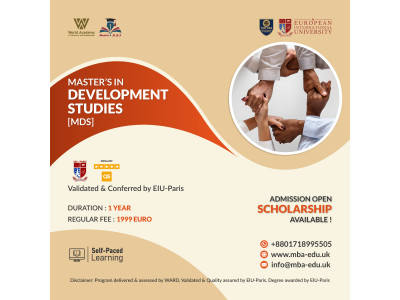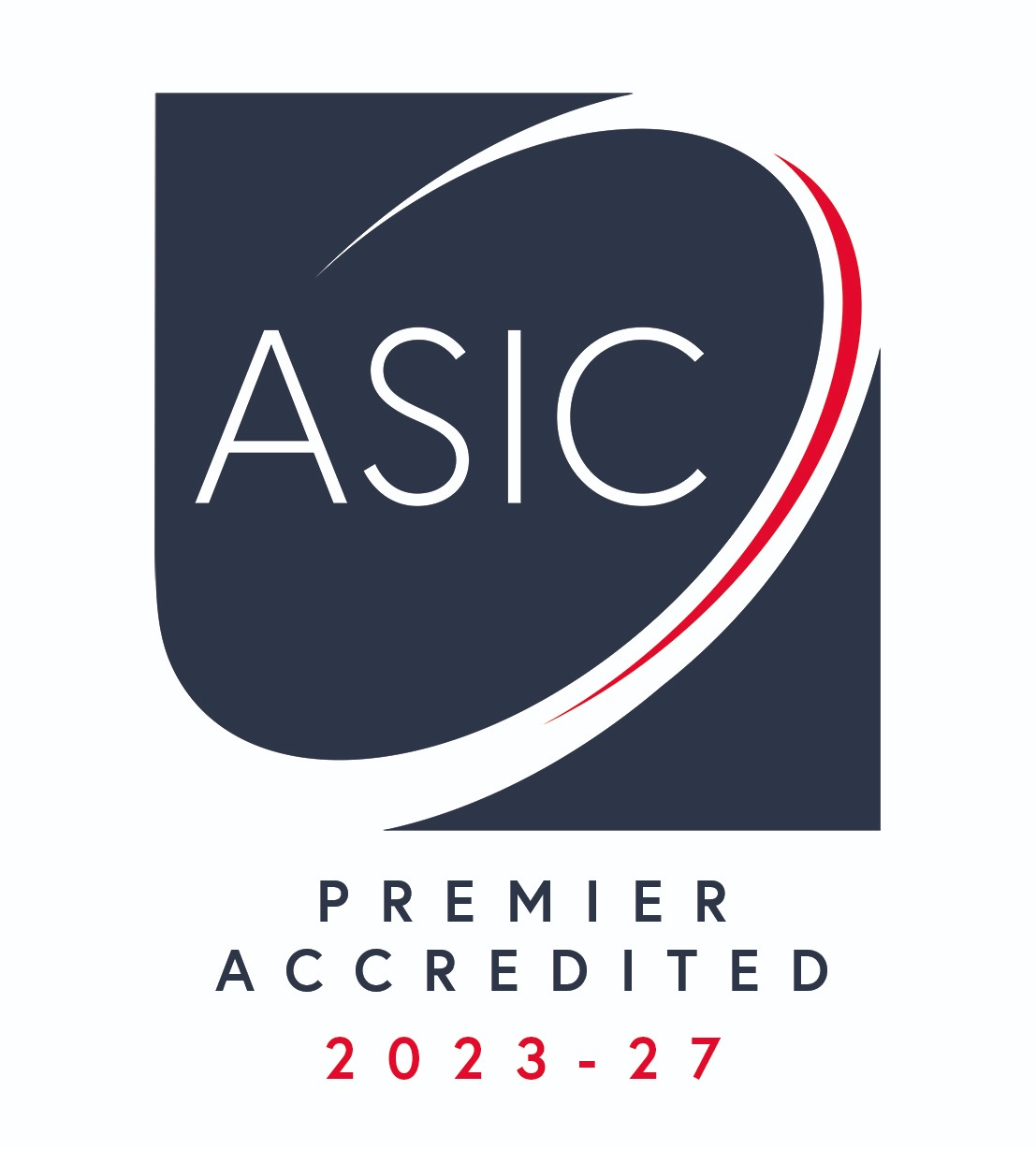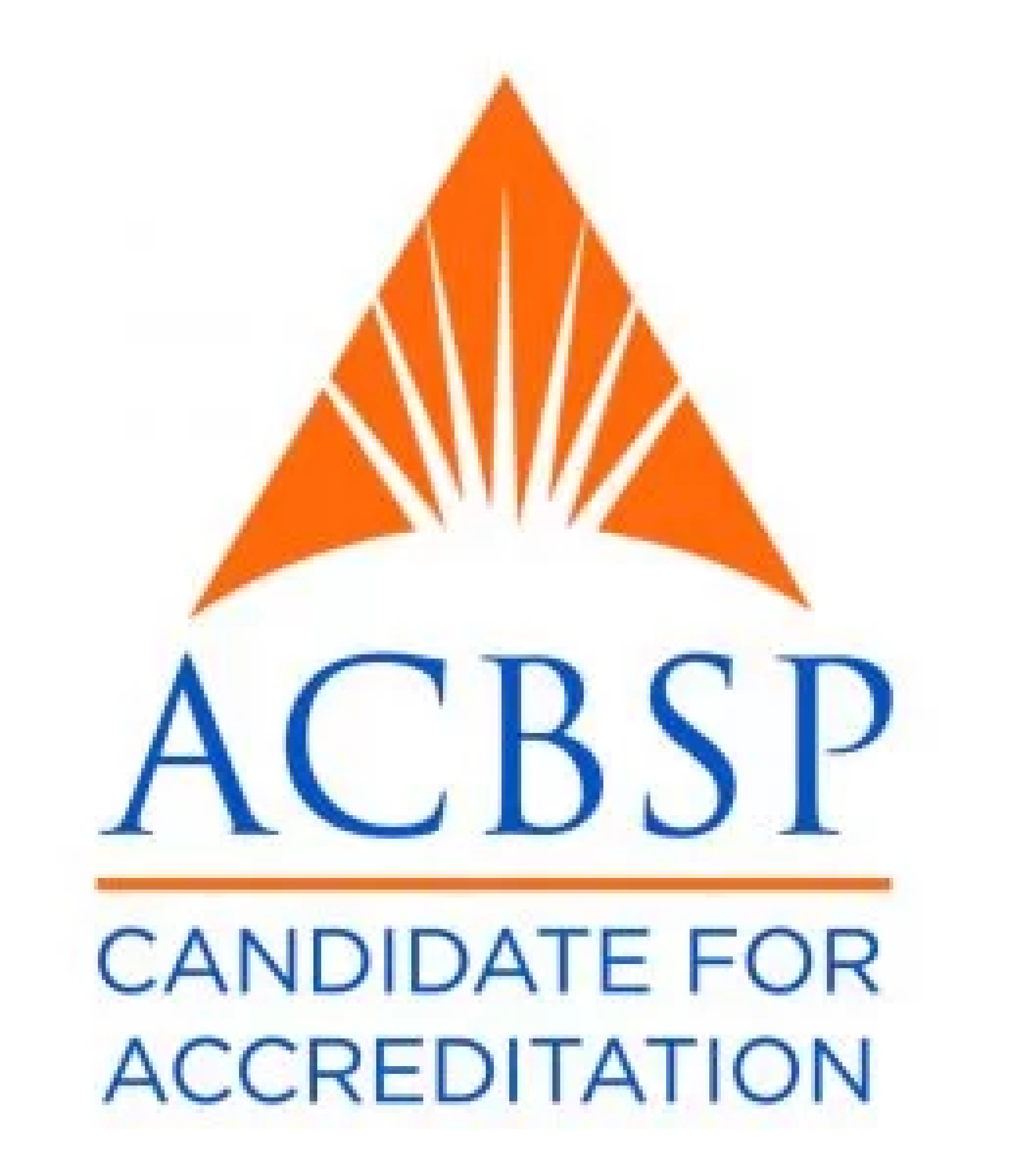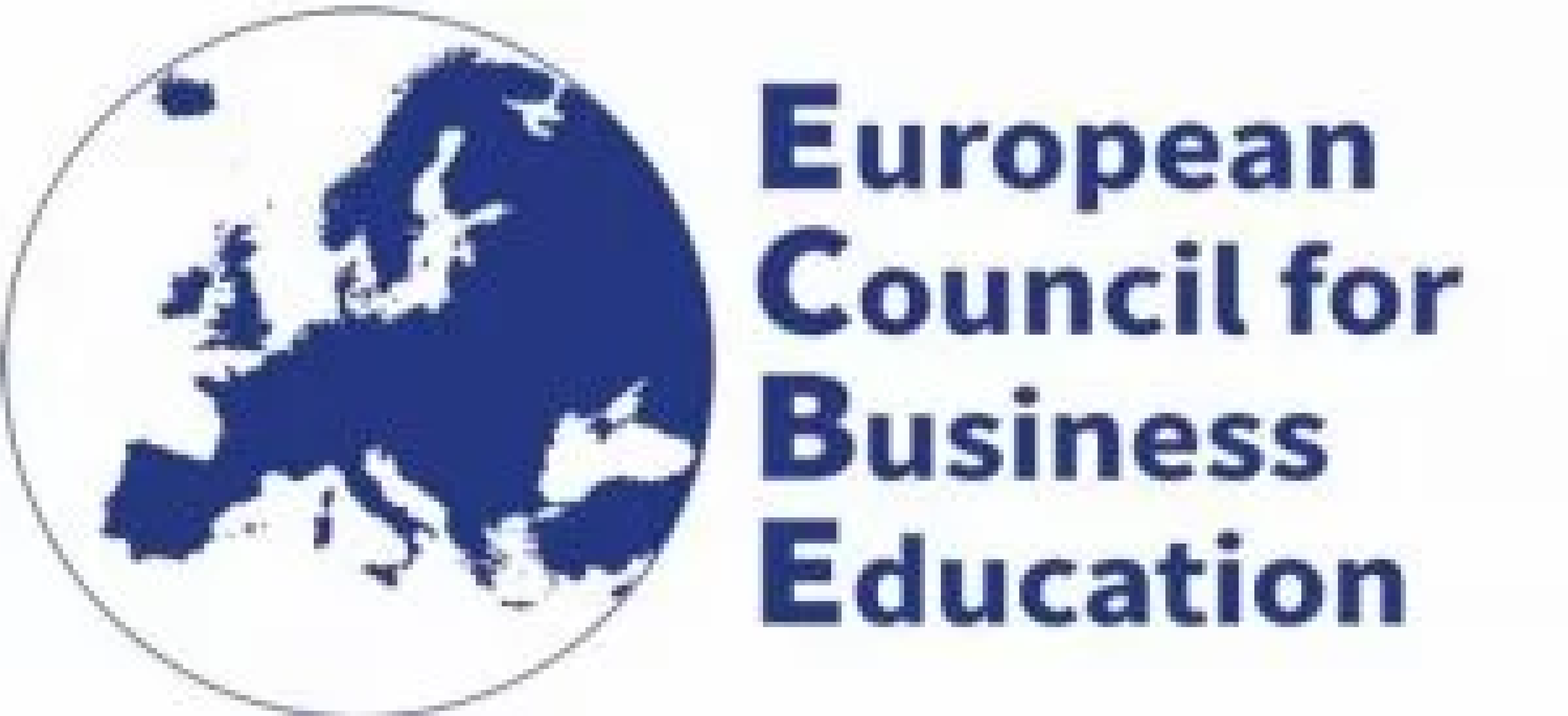
Validated, Quality Assured And Degree Awarded By EIU-PARIS
The Master’s in Development Studies is an interdisciplinary graduate program designed to provide students with a deep understanding of the complexities and challenges of development as experienced in various regions around the world. This course bridges the gap between theory and practice in development, incorporating insights from economics, sociology, political science, anthropology, and environmental science. It equips students with the tools and knowledge necessary to analyze development problems and to design and manage development programs that are sustainable, inclusive, and effective.
Comprehensive Understanding: To provide students with a thorough grounding in the theories and practices of development studies, including an understanding of both the macro and micro aspects of development.
Analytical Skills: To develop critical analytical skills that enable students to assess development needs, propose innovative solutions, and evaluate the effectiveness of development policies and programs.
Research Proficiency: To enhance research skills in development studies, enabling students to conduct fieldwork, utilize qualitative and quantitative research methodologies, and contribute original research to the field.
Practical Experience: To offer practical experience through case studies, internships, and interaction with development professionals and organizations, preparing students for real-world challenges in development.
Interdisciplinary Approach: To foster an interdisciplinary approach that draws on various academic disciplines, helping students to address development issues in a holistic and integrated manner.
Global and Local Perspectives: To balance global perspectives on development with localized, context-specific understanding, ensuring that students can operate effectively in diverse settings.
Leadership and Ethical Governance: To cultivate leadership skills and ethical considerations essential for governance and management of development projects, focusing on transparency, accountability, and community involvement.
Entry Requirements:
• Recognized Bachelor Degree in any field or Recognized Post Graduate Diploma (PGD)
• Sufficient English language proficiency.
• At least 1 year of working experience.
• Participants must have the facility of smart phone or laptop or computer to maintain the program activity.
Mature Entry Route (done on case-by-case evaluation basis only):
• Candidates without any prior tertiary education and qualification should possess at least 10 years of professional working experience in the field of Business, Management, or related areas of work.
• Candidates who have completed HND Level 4 (Diploma) should possess at least 7 years of professional working experience in the field of Business, Management, or related areas of work.
• Candidates who have completed HND Level 5 (Higher Diploma) should possess at least 4 years of professional working experience in the field of Business, Management, or related areas of working experience.
Unit/Subjects:
M-961: Introduction to Development Studies
Introduction:
This foundational subject introduces students to the field of Development Studies, exploring its multidisciplinary nature and the range of theoretical approaches used to understand development. Students will examine the evolution of development theories and practices, the role of major international development organizations, and the impact of globalization on development processes.
Learning Outcomes:
1.Understand the historical and theoretical foundations of Development Studies.
2.Analyze different development theories including modernization, dependency, and world-systems theory.
3.Evaluate the roles and impacts of major international and regional development organizations.
4.Critically assess the influence of globalization on developing countries.
5.Develop a multidisciplinary approach to addressing development challenges.
M-962: Health and Development
Introduction:
This subject explores the critical interlink ages between health and development. It addresses public health challenges, health policy, and the role of health in promoting economic and social development. Students will learn about global health issues, policy responses, and the importance of sustainable health systems.
Learning Outcomes:
1.Analyze the relationship between health and development with a focus on public health systems and policies.
2.Evaluate global health challenges including communicable and non-communicable diseases.
3.Assess the impact of environmental factors on health.
4.Develop strategies for improving health systems in low and middle-income countries.
5.Critically examine the role of international health organizations in shaping health outcomes.
M-963: Education and Development
Introduction:
Education is a pivotal element in sustainable development. This subject examines how educational policies, systems, and practices can contribute to developmental goals. It covers topics such as educational planning, literacy, equity in education, and the role of technology in education.
Learning Outcomes:
1.Understand the role of education in promoting development.
2.Analyze challenges and opportunities in educational systems worldwide.
3.Evaluate the impact of educational policies on social and economic development.
4.Design interventions to improve access and quality of education in various contexts.
5.Assess the role of technology and innovation in enhancing educational outcomes.
M-964: Environmental Policy and Development
Introduction:
This subject delves into the essential role of environmental policy in sustainable development. It covers frameworks for environmental management, the impact of policies on conservation and sustainability, and the challenges of integrating environmental considerations into developmental planning.
Learning Outcomes
1.Understand key environmental policies and their role in sustainable development.
2.Analyze the effectiveness of different policy instruments in managing environmental resources.
3.Evaluate the impact of environmental policies on development projects.
4.Design sustainable solutions to environmental challenges in development.
5.Assess the role of international treaties and agreements in shaping environmental governance.
M-965: Urban Development
Introduction:
Urban Development examines the dynamics of urban growth and its implications for development. The subject covers urban planning, governance, infrastructure, and the socioeconomic aspects of urban environments, providing insights into managing urbanization effectively.
Learning Outcomes
1.Analyze the causes and consequences of urbanization.
2.Evaluate urban planning and policy responses to urban challenges.
3.Design strategies for sustainable urban development.
4.Assess the impact of urban governance on development outcomes.
5.Understand the interplay between urban infrastructure and quality of life.
M-966: Rural Development and Agricultural Policy
Introduction:
This subject focuses on the development issues specific to rural areas and the critical role of agriculture in sustaining rural economies. It covers agricultural policies, rural infrastructure, and the social and economic aspects of rural development.
Learning Outcomes:
1.Understand the challenges and opportunities in rural development.
2.Analyze agricultural policies and their impact on rural communities.
3.Design and evaluate rural development projects and policies.
4.Assess the role of rural infrastructure in promoting development.
5.Understand the socioeconomic factors influencing rural livelihoods.
M-967: Gender and Development
Introduction:
Gender and Development explores the impact of gender on various aspects of development. This subject examines gender theories, gender mainstreaming in development projects, and the specific challenges faced by women and other gender groups in development.
Learning Outcomes:
1.Understand key gender theories and their application in development studies.
2.Analyze the impact of development policies and practices on different genders.
3.Develop strategies for integrating gender perspectives into development projects.
4.Evaluate the effectiveness of gender mainstreaming efforts.
5.Assess the role of international and local movements in promoting gender equality.
M-968: Human Rights and Development
Introduction:
This subject explores the relationship between human rights and development. It covers the foundations of human rights, the integration of rights into development practice, and the impact of development policies on human rights standards.
Learning Outcomes:
1.Understand the fundamental principles and frameworks of human rights.
2.Analyze the intersection of human rights with development issues.
3.Evaluate the impact of development projects on human rights.
4.Design development initiatives that promote and protect human rights.
5.Assess the role of international human rights organizations and mechanisms in development.
Accreditation & Recognition EIU-Paris :

ASIC-UK (Accreditation)
The University has earned Premier status with Accreditation Service for International Schools, Colleges and Universities (ASIC) for its commendable areas of operation.

ACBSP (Program Accreditation & Professional Member)
The Accreditation Council for Business Schools and Programs (ACBSP), US based CHEA recognised Accreditation body has approved EIU’s application for Candidacy for Programme Accreditation.

BGA (Member)
The Business Graduates Association (BGA) is an international membership and quality assurance body of world-leading and high-potential Business Schools.

ECBE (Member)
ECBE is a prestigious international accreditation agency who recognizes EIU’s endeavor in providing high-quality education in vocation-focused and job skills specific programmes and qualifications.

CIA (Member)
EIU intends to collaborate with Cambridge International in such initiative as Publishing in Partnership (PiP Model), Research Acceleration, Scholarly Dissemination, and Training Implementation.

ATHEA (Member)
Being a member is to operate as a tertiary educational institution, focusing on programme of higher education, be in existence for at least 1 year, and offer and teach their own institution’s programmes.
Course overview:
Required Documents for Admission:
Grading Systems:
Pass:
Fail:
Q: What is the self-paced Master's programme, and how does it work?
A: Our self-paced Master's programme is designed to provide participants with the flexibility to complete their degree at their own pace, anytime and anywhere. Participants will have access to our online learning platform, where they can complete coursework & interact with instructors. With no fixed lecture schedule, participants can manage their time effectively to balance work, personal, and academic commitments.
Q: What are the benefits of a self-paced Master's programme?
A: Our self-paced program offers numerous benefits, including flexibility, convenience, and personalized learning. Participants can accelerate or decelerate their pace according to their needs, allowing them to manage their time effectively and achieve their academic goals.
Q: How long does it take to complete the self-paced Master's programme?
A: The duration of the program is 01 (One) year. Depending on individual circumstances participant can take additional 06 (Six) months to complete the program.
Q: Are there any prerequisites for admission to the self-paced Master's programme?
A: Yes, applicants must hold a bachelor's degree from an accredited institution and meet the program's specific admission requirements, which may include reference letters, a personal statement, personal identification.
Q: How will I be assessed in this programme?
A: The assessment is based on assignments and research paper only. There will be no exams.
Q: How do I interact with instructors in a self-paced programme?
A: Our online learning platform provides various tools for participants to interact with instructors, including discussion about the subject matter and usually the reply is given within 24-48hrs.
Q: Is the self-paced Master's programme globally recognized?
A: The Master's programme is validated (audited, quality controlled and quality assured) by our academic partner universities.
Q: Do I have any advantage if I apply for a 2nd Masters?
A: Yes, There will be a special discount available when applied for a second master’s programme.
Q: What kind of technical support is available for the online platform?
A: Our technical support team is available 24/7 to assist with any technical issues or concerns. Participants can contact us via email, phone, or live chat for prompt support.
Q: Are there any scholarships available for the self-paced Master's programme?
A: Yes, we are offering partial scholarships to help make our programme more affordable. Please visit our website or contact our representative to know more.
We hope this FAQ helps! If you have any further questions, please don't hesitate to reach out to our admissions team.
| Regular Fee | 1999.00 |
| Partial Scholarship | Available |
| Intake | Monthly Intake |
To apply for the Master’s program with partial scholarship offered, candidates are requested to submit the following documents: